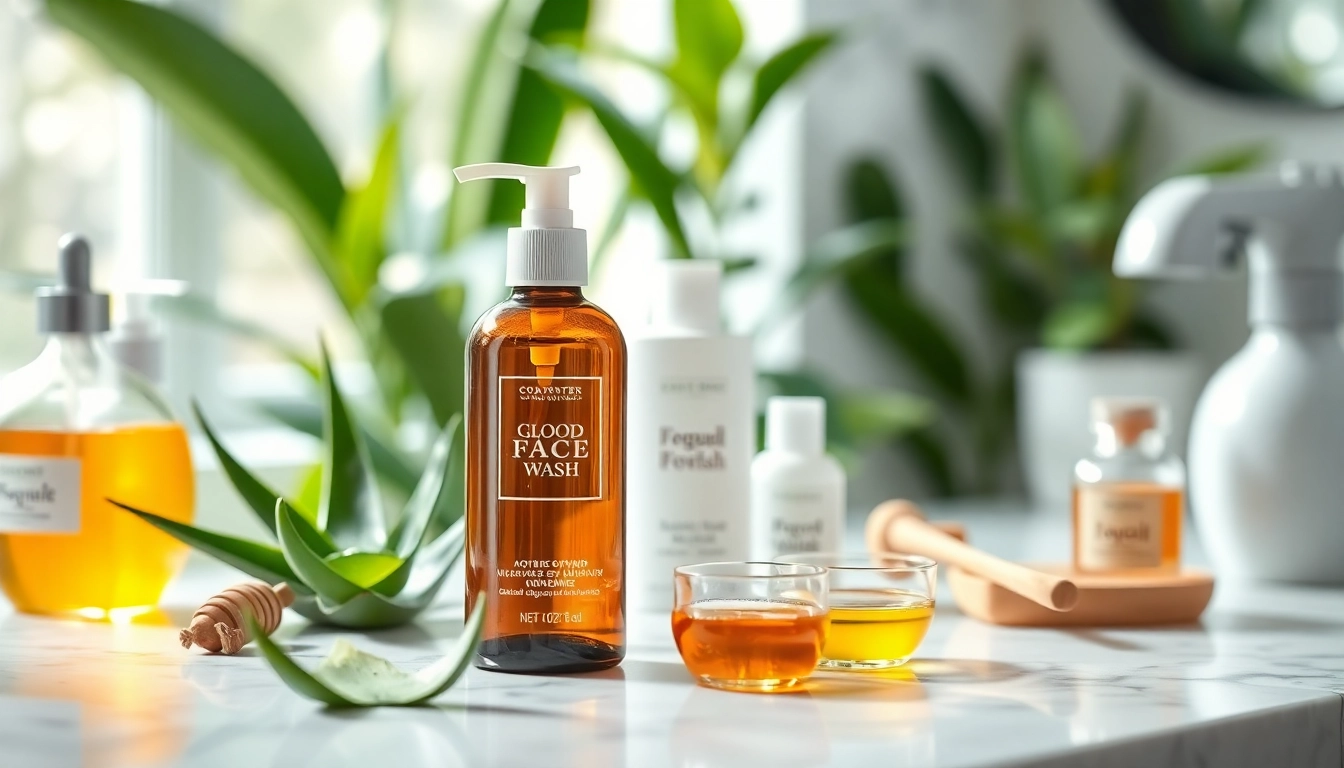Understanding Your Skin Type
When it comes to skincare, identifying your specific skin type is crucial for selecting the right products that cater to your unique needs. Using a good face wash tailored to your skin type can make a world of difference in maintaining healthy skin. Here, we break down the characteristics of various skin types to help you make informed choices.
1. Identifying Oily Skin Characteristics
Oily skin is often characterized by an excess of sebum that can lead to a shiny appearance, enlarged pores, and a higher propensity for acne and blemishes. Common signs include:
- Shiny areas, particularly on the forehead, nose, and chin (often referred to as the T-zone).
- Frequent breakouts and blackheads.
- Thicker skin texture.
It’s essential to select a face wash that effectively controls oil without stripping the skin of its natural moisture. Look for products labeled ‘oil-free’ or those that contain salicylic acid, which can help keep pores clear and reduce acne flare-ups.
2. Recognizing Dry Skin Signs
Dry skin often feels tight, rough, and may occasionally flake or itch. It typically has a dull appearance and can lead to visibly aging skin. Key indicators include:
- Rough patches or scaly skin, especially on the arms and legs.
- Redness, irritation, or inflammation.
- A tendency for fine lines and wrinkles to become more pronounced.
For dry skin, opting for a creamy or hydrating face wash can be beneficial. Look for ingredients like glycerin, hyaluronic acid, or natural oils, which help to lock in moisture while cleansing.
3. What is Combination Skin?
Combination skin is characterized by having both oily and dry areas. Typically, the T-zone remains oily while the cheeks and other areas may be dry or normal. Signs of combination skin include:
- Oily areas accompanied by dry patches.
- Enlarged pores in oily areas, with the skin elsewhere appearing dull.
- Occasional breakouts in the oily zones, while other areas are prone to dryness.
For combination skin, it’s crucial to choose a face wash that balances oil production while providing hydration. Consider gel-based cleansers that contain botanical extracts to cater to both oily and dry zones effectively.
Benefits of Using the Right Face Wash
Using a suitable face wash offers myriad benefits that extend beyond simple cleanliness. Understanding these advantages can empower you to choose the correct product and establish a thrifty skincare routine that supports long-term skin health.
1. Improved Skin Health with Good Face Wash
Consistent use of a well-formulated face wash can lead to significant improvements in overall skin health. By removing dirt, pollutants, excess oil, and makeup, your skin can breathe better and function optimally. With clearer pores and less buildup, skin is less likely to become inflamed, leading to fewer breakouts and a healthier overall appearance.
2. How Cleansing Affects Your Routine
The cleansing step is often referred to as the foundation of a successful skincare regime. By starting your day with a fresh canvas, you enable subsequent products, like serums and moisturizers, to penetrate deeper and work more effectively. Furthermore, washing your face in the evening removes the impurities accumulated throughout the day, preparing your skin for nighttime recovery and repair.
3. The Role of pH Balance in Cleansers
A well-balanced pH is crucial for the skin’s protective barrier, known as the acid mantle. Using face washes with a pH that aligns closely with your skin (around 4.5 to 5.5) prevents irritation and dryness, ensuring that your skin remains healthy. A cleanser that disrupts this balance can lead to increased sensitivity and potential skin issues. Therefore, it’s vital to choose a product designed to maintain this natural equilibrium.
Key Ingredients to Look for in a Good Face Wash
The formulation of a face wash plays a significant role in its effectiveness. Understanding the key ingredients to look for can help you make informed decisions when selecting the right product for your skin type.
1. Natural Ingredients vs. Synthetic
In recent years, there has been a growing trend toward using natural ingredients in skincare due to their efficacy and lower likelihood of irritation. Popular natural ingredients include:
- Aloe Vera: Provides soothing and healing properties.
- Tea Tree Oil: Renowned for its antibacterial properties, helping to combat acne.
- Chamomile: A natural anti-inflammatory that calms the skin.
While natural ingredients are excellent, synthetic options can also be effective. Ingredients like salicylic acid, glycolic acid, and activated charcoal serve specific functionalities, such as exfoliating or absorbing excess oil. Understanding both types’ pros and cons can guide you towards finding what works best for your skin.
2. Exfoliating Agents to Consider
Exfoliating agents are essential in face washes for effectively removing dead skin cells and promoting cell turnover. This is particularly important if you are prone to clogged pores or dull skin. Common exfoliants include:
- AHAs (Alpha Hydroxy Acids): These water-soluble acids help to exfoliate the surface layer of the skin, creating a smoother texture.
- BHAs (Beta Hydroxy Acids): Oil-soluble and excellent for penetrating pores, they are ideal for oily or acne-prone skin.
- Physical exfoliants: These include scrubs with fine particles but should be used with caution to avoid skin damage.
When selecting a face wash with exfoliating agents, consider your skin’s sensitivity and choose products with gentle formulations.
3. Moisturizing Ingredients That Help
A good face wash should not only cleanse but also help maintain hydration levels in your skin. Look for moisturizing ingredients like:
- Glycerin: A humectant that draws moisture to the skin.
- Hyaluronic Acid: Known for holding up to 1000 times its weight in water, making it an excellent hydrating ingredient.
- Natural Oils: Oils like jojoba, coconut, or argan help to nourish and hydrate the skin.
Incorporating these moisturizing components into your face wash can help avoid the tightness and dryness that often follows cleansing, leaving your skin supple and hydrated.
How to Use Face Wash Effectively
Using your face wash correctly is paramount to reaping its full benefits. This includes timing, technique, and pairing with complementary skincare products.
1. The Right Cleansing Technique
To maximize the effectiveness of your face wash, implement the following steps in your cleansing routine:
- Start by wetting your face with lukewarm water, which helps to open up the pores.
- Apply a small amount of face wash to your fingertips and gently massage it into your skin with circular motions for about 30 seconds.
- Pay extra attention to areas prone to oiliness or dirt accumulation, like the T-zone.
- Rinse thoroughly with lukewarm water and gently pat your face dry with a clean towel.
This technique not only ensures adequate cleansing but also promotes circulation, giving your skin a healthy glow.
2. Frequency of Use for Different Skin Types
When it comes to how often to wash your face, it can vary based on your skin type:
- Oily Skin: Twice a day is ideal to control excess oil and prevent breakouts.
- Dry Skin: Once a day at night is often sufficient; over-washing can exacerbate dryness.
- Combination Skin: The general recommendation is similar to that for oily skin, but pay attention to dry areas and adjust accordingly.
Ultimately, attentiveness to how your skin reacts will guide you in developing the most beneficial cleansing routine.
3. Complementary Skincare Products for Better Results
Your face wash is just one component of your skincare regimen. To enhance its effectiveness, integrate complementary products, such as:
- Toners: These help rebalance skin’s pH after cleansing and can provide additional hydration.
- Serums: Target specific concerns, such as aging, pigmentation, or acne.
- Moisturizers: Important for all skin types, they create a protective barrier against environmental factors while locking in moisture.
Formulating a consistent skincare routine that incorporates these components can amplify the positive effects of your face wash and yield healthier, more radiant skin.
Expert Recommendations for the Best Face Wash
With a plethora of products available in the market, identifying the best face wash can be daunting. Here, we compile expert recommendations based on skin types to simplify your decision-making process.
1. Top Picks for Oily Skin
For those struggling with oily skin, consider the following products:
- CeraVe Foaming Facial Cleanser: This product contains ceramides and niacinamide, which help to cleanse while maintaining the skin barrier.
- Neutrogena Oil-Free Acne Wash: Enriched with salicylic acid, it’s designed to tackle acne and control excess oil without over-drying.
- La Roche-Posay Effaclar Purifying Foaming Gel: A gentle gel cleanser that helps to purify the skin while maintaining its natural moisture balance.
2. Best Options for Sensitive Skin
Individuals with sensitive skin need to approach cleansing with caution. These products are highly recommended:
- Clinique Liquid Facial Soap (Mild): A gentle formula, free of fragrances and harsh ingredients, that effectively removes impurities without causing irritation.
- First Aid Beauty Pure Skin Face Cleanser: Infused with aloe and glycerin, it soothes while cleansing and is appropriate for all skin types.
- EltaMD Foaming Facial Cleanser: A gentle, foam-based cleanser that maintains moisture levels and supports a healthy skin barrier.
3. Recommendations for Mature Skin Types
Mature skin requires additional care. Here are some excellent cleanser choices:
- Olay Regenerist Regenerating Cream Cleanser: Combines gentle exfoliation with anti-aging benefits.
- Dermalogica Essential Cleansing Solution: A rich, creamy formula that hydrates and nourishes while removing dirt and impurities.
- Philosophy Purity Made Simple: A 3-in-1 cleanser that leaves the skin feeling clean and hydrated without stripping natural oils.



